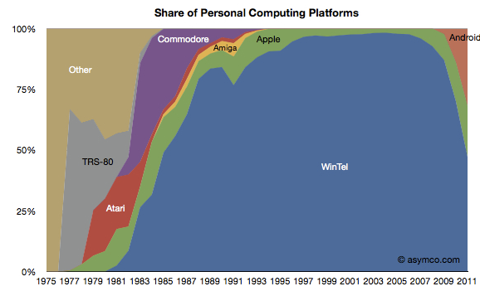The blog for all the best contemporary movies, avant-garde, risque cinema, without censoriship.
Monday, November 26, 2012
Sunday, November 25, 2012
TECHNOLOGY BUSINESS & IT: Microsoft's Long And Winding Road To Becoming Kind Of Cool
November 25, 2012
By Jon Evans

Long have I hated Microsoft (MSFT). For decades their bloated mediocrity infuriated every fiber of my being. Like Adam Sandler and leaf-blowers, for a very long time, they represented everything that was wrong with today's world. But just as Adam Sandler went and made Punch Drunk Love, over the last few years, Microsoft has released a body of work that even I must grudgingly admit is interesting, innovative, and sometimes downright visionary.
Take Kinect. It began life as "merely" a cool game interface, but it's steadily becoming Quite A Big Deal. It's being used for 3D modelling, within web browsers, and in a whole panoply of third-party applications.
And that's just one of the genuinely fascinating innovations - including bioprogramming, a universal translator, and virtual reality - bubbling up from what our own Natasha Lomas called Microsoft's "cauldron of ideas," Microsoft Research.
Not long ago Microsoft security was a joke; it seemed like every non-techie I knew had had their Wintel machine hacked or compromised, and you hardly dared to type a password in an Internet cafe. Now, though, not a single Microsoft project features among Kaspersky's Top 10 list of vulnerabilities.
The Surface is getting, at best, mixed reviews (of note, MG is downright contemptuous, while Jeff Atwood really likes it), but even its staunchest critics have to admit that Microsoft's tablet/laptop crossover is, at least, somewhat interesting and innovative - if ultimately unsuccessful.
This raises a larger point: Microsoft is now further along than Apple (AAPL) and Google (GOOG) at integrating their mobile and desktop OSes. Windows 8 is a giant step ahead on that journey, while the other two are still stuck with their iOS/OS X and Android/Chrome OS bifurcations. (Though I expect both forks to merge in the next couple of years.) And whatever you think of Windows 8′s "Metro" interface, you have to admit, at least it's new and not boring.
What happened to the staid, colorless, bland, third-rate Microsoft that we used to know? Why is even the mighty Woz worried that Microsoft has become more innovative than Apple? Well, here's the answer for you in a single graph, courtesy of Horace Dediu of Asymco:
(click to enlarge)
The graph clearly shows that the Wintel monopoly that dominated personal computing for so long is now well and truly dead. (And this graph is almost a year old.) Microsoft has to innovate now. It's that or die.
Trouble is, even if they do innovate, that doesn't mean that Microsoft will live, because "new" and "interesting" are completely orthogonal to "successful." Out of everything I mentioned above, only the Kinect is a hit. Of course they're not in any immediate danger - they're still a massively profitable behemoth - but as Paul Graham points out, revenue is a lagging indicator in the tech world.
Are we witnessing Microsoft's long-awaited phoenix-like reinvention or the first stirrings of its death spasms? I don't know, but either way, I'm pretty sure it's going to be interesting to watch.

Long have I hated Microsoft (MSFT). For decades their bloated mediocrity infuriated every fiber of my being. Like Adam Sandler and leaf-blowers, for a very long time, they represented everything that was wrong with today's world. But just as Adam Sandler went and made Punch Drunk Love, over the last few years, Microsoft has released a body of work that even I must grudgingly admit is interesting, innovative, and sometimes downright visionary.
Take Kinect. It began life as "merely" a cool game interface, but it's steadily becoming Quite A Big Deal. It's being used for 3D modelling, within web browsers, and in a whole panoply of third-party applications.
And that's just one of the genuinely fascinating innovations - including bioprogramming, a universal translator, and virtual reality - bubbling up from what our own Natasha Lomas called Microsoft's "cauldron of ideas," Microsoft Research.
Not long ago Microsoft security was a joke; it seemed like every non-techie I knew had had their Wintel machine hacked or compromised, and you hardly dared to type a password in an Internet cafe. Now, though, not a single Microsoft project features among Kaspersky's Top 10 list of vulnerabilities.
The Surface is getting, at best, mixed reviews (of note, MG is downright contemptuous, while Jeff Atwood really likes it), but even its staunchest critics have to admit that Microsoft's tablet/laptop crossover is, at least, somewhat interesting and innovative - if ultimately unsuccessful.
This raises a larger point: Microsoft is now further along than Apple (AAPL) and Google (GOOG) at integrating their mobile and desktop OSes. Windows 8 is a giant step ahead on that journey, while the other two are still stuck with their iOS/OS X and Android/Chrome OS bifurcations. (Though I expect both forks to merge in the next couple of years.) And whatever you think of Windows 8′s "Metro" interface, you have to admit, at least it's new and not boring.
What happened to the staid, colorless, bland, third-rate Microsoft that we used to know? Why is even the mighty Woz worried that Microsoft has become more innovative than Apple? Well, here's the answer for you in a single graph, courtesy of Horace Dediu of Asymco:
(click to enlarge)

The graph clearly shows that the Wintel monopoly that dominated personal computing for so long is now well and truly dead. (And this graph is almost a year old.) Microsoft has to innovate now. It's that or die.
Trouble is, even if they do innovate, that doesn't mean that Microsoft will live, because "new" and "interesting" are completely orthogonal to "successful." Out of everything I mentioned above, only the Kinect is a hit. Of course they're not in any immediate danger - they're still a massively profitable behemoth - but as Paul Graham points out, revenue is a lagging indicator in the tech world.
Are we witnessing Microsoft's long-awaited phoenix-like reinvention or the first stirrings of its death spasms? I don't know, but either way, I'm pretty sure it's going to be interesting to watch.

TELEVISION BUSINESS: Broadcasters should embrace the YouTube world
Recently, though, the term has been used as a catch-all for programming delivered over the Internet, on platforms such as Netflix, iTunes, and YouTube. Its irresistible march forward has rendered broadcasters in countries with regulatory regimes that blunt foreign competition (here's looking at you, Canada!) in a state of mounting anxiety. National regulators in some countries (er, here's looking at you, Canada) have largely bought the woe-is-us arguments of programmers and cable or satellite distributors, and loosened restrictions in areas such as market concentration to help them meet the foreign threats. When BCE announced its $3-billion bid for Astral last March, both companies pointed to growing competition from Netflix and others as a catalyst for the deal.
But what if over-the-top TV isn't just a threat, but also an opportunity? Because that's the way it's looking for those who produce or own the rights to unique programming.
In the past few months, the LGBT-themed channel OutTV has moved to embrace the future embodied in over-the-top TV and the global marketplace it represents. (The Vancouver-based Out is the successor of PrideVision TV, where the sort of material now on HARD used to air during late-night hours.) It sells programming on iTunes, and promotes its conventional TV channel by putting clips or entire shows on its website and YouTube.
And lately the channel's executives have noticed that YouTube is also an unexpected business-to-business marketing venue.
"Classically, the media business is a vertical business, by which I mean national," explained Brad Danks, OutTV's chief operating officer, when I spoke with him Wednesday. "We construct all our broadcasting rules, all our copyright laws, around the idea of a national broadcasting business. But the business is more naturally horizontal, it's more global."
OutTV has a potentially huge transnational audience, made up of individuals nestled in small pockets around the world. When Mr. Danks looks at the list of territories where viewers are taking in clips of RuPaul's Drag Race All-Stars or Don't Quit Your Gay Job on YouTube, he said, "Arab and Muslim countries" are consistently in the top 10. "Brazil is always high, Japan is very high ... all the way down to small islands in the South Pacific and people in Greenland.
"You begin to realize that the future of broadcasting - there will always be local elements, always be national elements - but the global marketplace will assert itself more and more."
In Canada, viewership on YouTube "leads to traction on the website, which then leads, we believe, to adoption or interest in certain shows," he suggested. That's key in a severely crowded market where even landing a spot on a cable or satellite service's main promotional or "barker" channel is an uphill climb. (OutTV is now in more than 1.2 million Canadian households.) It also leads to sales on YouTube and iTunes, where the shows are available for purchase. Mr. Danks believes those sales could eventually bring in 25 to 50 per cent of a program's production budget - and, perhaps, finally bring the channel into the black.
And while OutTV is only licensed for domestic carriage, it is riding over-the-top into the global marketplace: It owns the international rights to a number of its shows, such as the dramatic series DTLA, and is able to transform YouTube viewership into foreign sales. Programming executives in other territories, "are watching the traction online," Mr. Danks said. Viewership numbers on YouTube are far more transparent than clicks on a company's website - they're right there, for anyone in the world to see. Prompted by viewers sampling DTLA online, he said Wednesday, "I literally just closed a deal today to sell the show in Benelux and Sweden."
"I always say, with LGBT, there's an audience but there's no market." By which he means: there may not be traditional TV channels on cable or satellite lineups in countries such as France that would pick up OutTV's programming, but there are viewers in those territories who want to see those shows. Which is where iTunes and other OTT sales platforms come in.
OutTV isn't the only Canadian broadcaster whose content is travelling to other countries on OTT platforms: the CBC show Little Mosque on the Prairie is on the U.S. service Hulu.
Last month, Mr. Danks said he listened to Pierre Karl Peladeau, the CEO of Quebecor, offer a keynote address at the annual TV confab MIPCOM in Cannes. "He said Canadians need to learn to make international formats of television that move globally," Mr. Danks recalled. "I just absolutely agree 100 per cent."
--
Manuel Canales
Managing Director
The Media Group Inc.
809.268.7920 Dominican Republic Mobile
416.784.5663 Canada Home Office

TELEVISION BUSINESS: TV production booms again in Canadian cities




Rob LaBelle, executive producer of the upcoming CTV show Motive, says the success of Flashpointhelped reignite Canada as a base of production for North American dramas.
Beyond the co-production craze, a new go-it-alone boom is generating some buzz. While both Motive and Citytv’s upcoming comedy Seed have international distribution deals, they are stand-alone Canadian shows produced without a U.S. network partnership.
For Canadian actors, writers, directors, producers and crew, this finally means more opportunities to work in Canada.
Toronto is home to many big budget TV productions, including the upcoming HBO Canada co-production Transporter, the Showcase/BBC America’s Copper, renewed for a second season, and the sci-fi series Defiance, coming next spring to Showcase.
CTV’s Saving Hope and Global’s Rookie Blue are shot in the same nearby Mississauga, Ont., warehouse. Beauty and the Beast, Covert Affairs and Lost Girl (Showcase), Bomb Girls (Global), Nikita (CTV) and Suits (Bravo) all call Toronto home, as does the upcoming CBC drama Cracked.
Vancouver is still home to U.S. network productions such as Supernatural, Arrow and Once Upon a Time. Besides Motive, new Canadian shows include the Citytv comedy Package Deal and Rogue, a Canada/U.K. co-production coming to The Movie Network/Movie Central.
Halifax is not just the home of 22 Minutes anymore, it is also where Call Me Fitz, Mr. D, Haven and the third Trailer Park Boys movie are all being shot, as well as Seed.
--
Manuel Canales
Managing Director
The Media Group Inc.
809.268.7920 Dominican Republic Mobile
Saturday, November 24, 2012
Monday, November 19, 2012
Wednesday, November 14, 2012
Monday, November 12, 2012
Friday, November 9, 2012
Thursday, November 8, 2012
Monday, November 5, 2012
Subscribe to:
Posts (Atom)